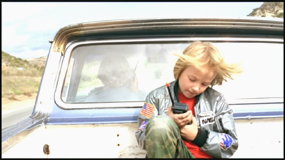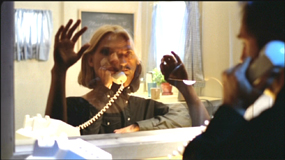|
Newest Reviews:
New Movies -
The Tunnel
V/H/S
The Tall Man
Mama Africa
Detention
Brake
Ted
Tomboy
Brownian Movement
Last Ride
[Rec]³: Genesis
Hara-Kiri: Death of a Samurai
Indie Game: The Movie
Abraham Lincoln: Vampire Hunter
Old Movies -
Touki Bouki: The Journey of the Hyena
Drums Along the Mohawk
The Chase
The Heiress
Show
People
The Strange Affair of Uncle Harry
Pitfall
Driftwood
Miracle Mile
The Great Flamarion
Dark Habits
Archives -
Recap: 2000,
2001, 2002,
2003, 2004
, 2005, 2006,
2007 , 2008
, 2009 ,
2010 , 2011 ,
2012
All reviews alphabetically
All reviews by star rating
All reviews by release year
Masterpieces
Screening Log
Links
FAQ
E-mail me
HOME
| |
Paris, Texas (Wim Wenders, 1984)
 In his Palm D’Or winning drama Paris, Texas, director Wim Wenders explores, and largely debunks,
the macho cowboy myth that powers great Westerns like The Searchers while updating it to a contemporary milieu. As the
film opens, we watch an unnamed man (Harry Dean Stanton) in blue jeans wandering
out of the expansive desert and back into civilization. Before long, we discover
his name, Travis, and that, for the previous four years, he’s dropped out of
society. Wenders, at least at first, presents Travis as a romanticized figure by
casting him against epic backdrops and giving his past a distinct air of
mystery, but each shred of information that’s revealed about him seems to
deflate that myth somewhat. The process through which the audience and the
characters on screen guess at his interior thoughts provides much of the tension
in the first half of the movie. As the people that Travis has left behind become
more firmly defined and the pain he’s running from becomes more evident,
though, it becomes increasingly difficult to see the heroic individualism that
makes the man some sort of living legend. By the end of Paris,
Texas, Wenders has made Travis achingly human. His flaws and his failures
are made clear, and his story takes on tragic, yet intimate, dimensions. In his Palm D’Or winning drama Paris, Texas, director Wim Wenders explores, and largely debunks,
the macho cowboy myth that powers great Westerns like The Searchers while updating it to a contemporary milieu. As the
film opens, we watch an unnamed man (Harry Dean Stanton) in blue jeans wandering
out of the expansive desert and back into civilization. Before long, we discover
his name, Travis, and that, for the previous four years, he’s dropped out of
society. Wenders, at least at first, presents Travis as a romanticized figure by
casting him against epic backdrops and giving his past a distinct air of
mystery, but each shred of information that’s revealed about him seems to
deflate that myth somewhat. The process through which the audience and the
characters on screen guess at his interior thoughts provides much of the tension
in the first half of the movie. As the people that Travis has left behind become
more firmly defined and the pain he’s running from becomes more evident,
though, it becomes increasingly difficult to see the heroic individualism that
makes the man some sort of living legend. By the end of Paris,
Texas, Wenders has made Travis achingly human. His flaws and his failures
are made clear, and his story takes on tragic, yet intimate, dimensions.
 The great achievement of Paris,
Texas is the way that it so thoroughly demonstrates how one can regress to a
point where direct communication becomes impossible. This is a movie is filled
with arresting observations about the ways that emotions contradict each other.
Take, for example, the coy game in which Travis’ estranged son mimics his
father’s actions from across the street. The boy’s tentative stance toward
his dad is played against his desire to reach out to him, resulting in a tense
interaction that avoids feel-good simplicity. In their relationship, we’re
always aware of the dangerous yet necessary influence that the father has upon
the boy. The mix of idolatry and reservation that exists in their scenes
together is palpable, and their entire road trip to find the boy’s mother is
filled with both the sense of romantic adventure that the wide-open backdrops
instill and uneasy fear that the boy might be following in his father’s
footsteps. When Travis finally reaches his destination, the two perfectly
modulated scenes that ensue are stomach-churning exhibitions of what happens
when the hurt hurts too much to allow one to reestablish an emotional
connection. From the wide open blue skies of Paris,
Texas’ opening shots, the film promises a potential escape from the
heartache, baggage and claustrophobia of the modern world. As skyscrapers begin
to dominate the frame in the second half of the movie, it instead presents a
crushing reality that few Westerns were willing to face head on. The great achievement of Paris,
Texas is the way that it so thoroughly demonstrates how one can regress to a
point where direct communication becomes impossible. This is a movie is filled
with arresting observations about the ways that emotions contradict each other.
Take, for example, the coy game in which Travis’ estranged son mimics his
father’s actions from across the street. The boy’s tentative stance toward
his dad is played against his desire to reach out to him, resulting in a tense
interaction that avoids feel-good simplicity. In their relationship, we’re
always aware of the dangerous yet necessary influence that the father has upon
the boy. The mix of idolatry and reservation that exists in their scenes
together is palpable, and their entire road trip to find the boy’s mother is
filled with both the sense of romantic adventure that the wide-open backdrops
instill and uneasy fear that the boy might be following in his father’s
footsteps. When Travis finally reaches his destination, the two perfectly
modulated scenes that ensue are stomach-churning exhibitions of what happens
when the hurt hurts too much to allow one to reestablish an emotional
connection. From the wide open blue skies of Paris,
Texas’ opening shots, the film promises a potential escape from the
heartache, baggage and claustrophobia of the modern world. As skyscrapers begin
to dominate the frame in the second half of the movie, it instead presents a
crushing reality that few Westerns were willing to face head on.
86
05-12-04
Jeremy Heilman
|